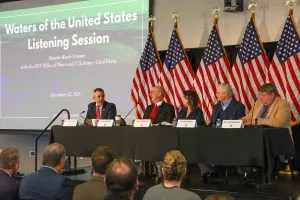 (North Dakota Monitor) – Attorneys for Greenpeace have asked a North Dakota judge to dismiss a lawsuit brought by the developer of the Dakota Access Pipeline over the environmental activist group’s organized opposition to the pipeline.
(North Dakota Monitor) – Attorneys for Greenpeace have asked a North Dakota judge to dismiss a lawsuit brought by the developer of the Dakota Access Pipeline over the environmental activist group’s organized opposition to the pipeline.
Thousands of protesters came to south-central North Dakota in 2016 and 2017 to protest construction of the pipeline in solidarity with the Standing Rock Sioux Tribe, which opposed the project out of concerns the pipeline infringed on its sovereignty and threatened to pollute its water supply. Greenpeace was among the activist groups that backed the demonstrations.
Energy Transfer Partners’ lawsuit, filed in Morton County District Court in 2019, accuses Greenpeace of criminal behavior — including trespassing, vandalism, arson as well as the harassment and assault of construction workers — to stop the pipeline, often referred to as DAPL. The pipeline company also alleges that the environmental group solicited money to support unlawful activity against the pipeline and incited riotous behavior by protesters.
On top of this, the plaintiffs claim Greenpeace orchestrated an misinformation campaign that ultimately convinced the federal government to halt construction of DAPL for roughly five months. They also say these actions led multiple banks to divest from the pipeline company.
Energy Transfer has asked for damages from Greenpeace in an amount to be awarded at trial.
The sprawling lawsuit includes thousands of court records.
In a Thursday afternoon hearing, attorneys for the defense argued that the case should be dismissed because Energy Transfer Partners has not offered any concrete evidence linking Greenpeace to the harms the company claims it suffered as a result of the DAPL demonstrations.
“Greenpeace cannot be responsible for the entire protest without evidence,” attorney Everett Jack told Southwest District Court Judge James Gion.
Jack noted that at the time of the protests, which took place north of the Standing Rock Reservation, Energy Transfer did not openly blame Greenpeace for halting construction of the pipeline. Instead, the company pointed fingers at other activist groups, the Standing Rock Sioux Tribe and President Barack Obama’s administration, he said.
He argued similarly that there isn’t proof that Greenpeace engaged in any criminal behavior. Jack said only six people from Greenpeace ever attended the demonstrations, and that those people were not in North Dakota when many of the criminal incidents that Energy Transfer cites in court records allegedly occurred.
Ashley Johnson, an attorney representing Energy Transfer, said the pipeline company has records of Greenpeace claiming responsibility for delaying DAPL as well as admitting to having a hand in illegal protest activity.
Johnson said that at the very least, a jury should be allowed to hear the evidence and make its own decision.
At the hearing, attorneys for Greenpeace also asked the judge to toss Energy Transfer’s request for damages.
Jack said Energy Transfer has no grounds to ask for monetary relief because there is no evidence Greenpeace harmed, or intended to harm, the pipeline company.
Energy Transfer attorney Gregg Costa said there is plenty of proof to the contrary.
“They thought the pipeline was evil,” Costa said. “There are mountains of evidence showing that.”
Greenpeace is not the only defendant in the case. Energy Transfer’s complaint also names a protest group called the Red Warrior Society, which was active at the DAPL demonstrations.
Energy Transfer in court filings accuses Greenpeace of coordinating with the Red Warrior Society to commit crimes against the pipeline company.
Steven Caplow, also representing Greenpeace, asked the judge to dismiss this part of the claim because the Red Warrior Society is not a legal entity.
“You can’t conspire with the Red Warrior Society, because it doesn’t exist,” Caplow said during the hearing.
Gion did not indicate when he would rule on Greenpeace’s motions.
This isn’t the first lawsuit Energy Transfer Partners has filed suit against Greenpeace for the Dakota Access Pipeline protests. The pipeline company in 2017 filed a racketeering suit against the organization in U.S. District Court asserting similar claims. A federal district court judge later dismissed that case.
The demonstrations ended in February 2017 after Gov. Doug Burgum ordered the camps to close. The pipeline, which carries oil from the Bakken formation to Illinois, was completed later that year.
In 2020, a judge pulled Energy Transfer’s easement, asking the U.S. Army Corps of Engineers to conduct more environmental research on the pipeline. It was allowed to continue operating.
The Army Corps of Engineers is still conducting the Environmental Impact Study. In May, the Corps indicated that its work may not be finalized until 2025, the Bismarck Tribune reported.
In another pending case related to DAPL, North Dakota seeks $38 million from the federal government for costs the state claims it suffered as a result of the 2016 and 2017 protests. That lawsuit went to trial earlier this year. A federal judge is expected to rule in the case in the coming months.










